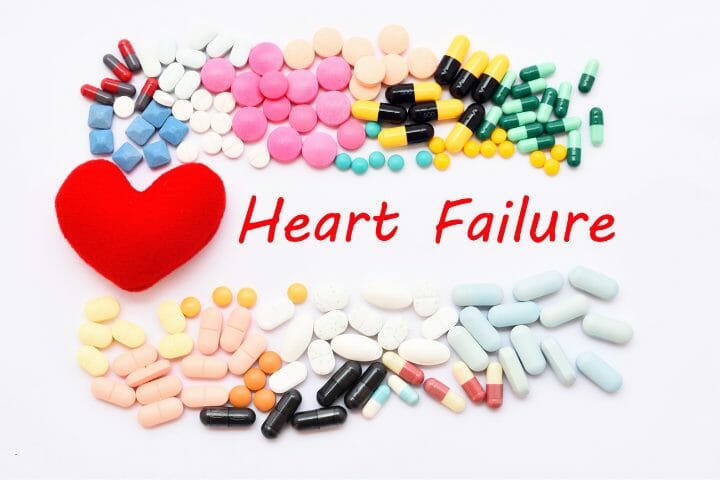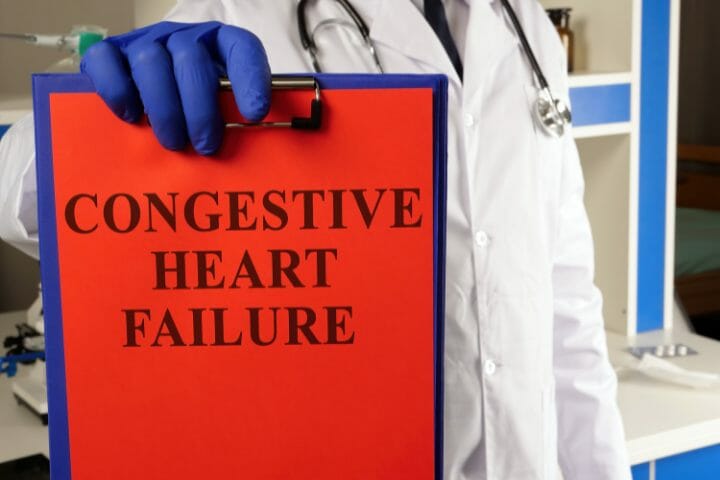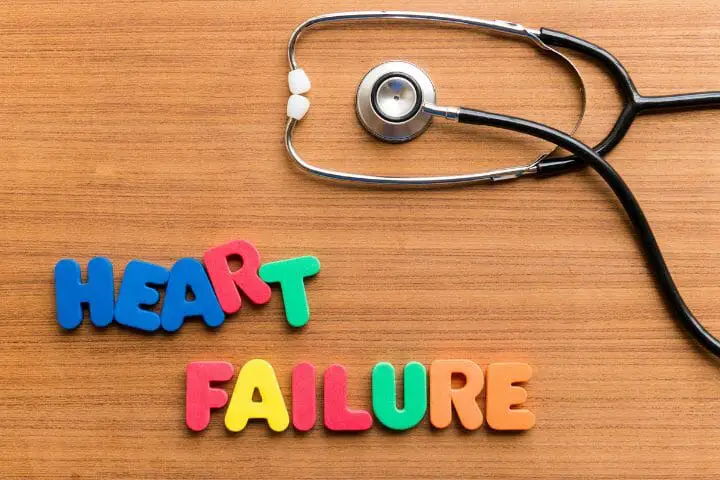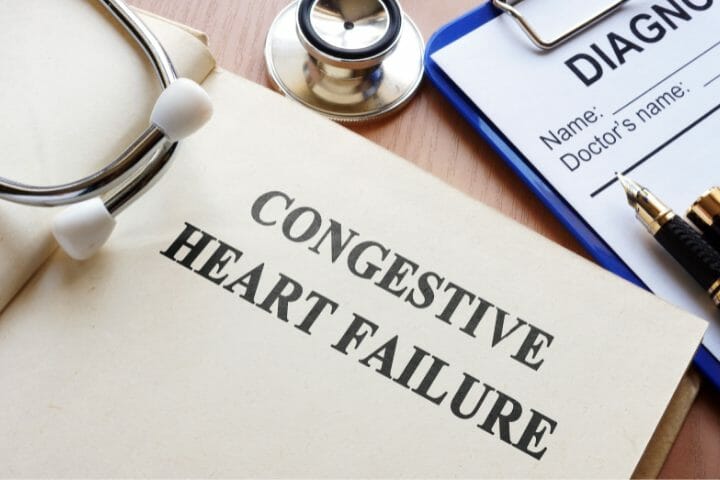Heart diseases such as congestive heart failure are one of the biggest killers in America. But can you get disability for congestive heart failure? What about other heart ailments? Read on to find out more about how you can claim disability for heart conditions.
Contents
Congestive Heart Failure is a severe medical condition that affects almost 1 to 2 million Americans. It can make it difficult for a person to work or do daily chores. If you have been diagnosed with Congestive Heart Failure, you may be wondering if you are eligible for disability benefits.

This article will provide an overview of disability benefits for people with Congestive Heart Failure. We will also discuss the steps you need to take to apply for disability benefits. So, keep reading to learn more about disability benefits for Congestive Heart Failure!
What Is Congestive Heart Failure?
Congestive heart failure (CHF) is when the heart can’t pump enough blood to meet the body’s needs. This can lead to fluid buildup in the lungs, abdomen, and other tissues.
CHF can be due to many conditions, including coronary artery disease, valvular heart disease, hypertension, and diabetes. Treatment focuses on relieving symptoms and preventing further worsening of the situation.
There are two types of CHF: systolic and diastolic. Systolic CHF occurs when the left ventricle can’t contract properly. Diastolic CHF occurs when the left ventricle does not relax properly between beats. Both types can occur together.
Symptoms of CHF include shortness of breath, fatigue, and swelling in the feet, ankles, and legs. These symptoms can worsen over time if not treated.

Causes of Congestive Heart Failure
There are many causes of congestive heart failure. Some of the more common ones include:
Coronary artery disease is common cause of congestive heart failure. It occurs when the arteries that supply blood to the heart become narrowed or blocked. This can decrease blood flow to the heart, eventually leading to congestive heart failure.
- High blood pressure: High blood pressure can damage the heart and lead to congestive heart failure.
- Heart valve disease: Heart valve disease can cause the valves in the heart to leak or become blocked. This can lead to decreased blood flow and eventually congestive heart failure.
- Diabetes: Diabetes can damage the heart and lead to congestive heart failure.
- Alcohol abuse: Alcohol abuse can damage the heart and lead to congestive heart failure.
- Obesity: Obesity can damage the heart and lead to congestive heart failure.
- Smoking: Smoking can damage the heart and lead to congestive heart failure.
If you have any of these risk factors, it is essential to talk to your doctor about reducing your risk of developing congestive heart failure.
You might also like to read: Can You Get Disability For Ehlers-Danlos Syndrome?
Objective Symptoms of Congestive Heart Failure
Several objective symptoms of congestive heart failure can help diagnose the condition. These include:
- A feeling of fatigue or tiredness
- Shortness of breath, especially during activity
- Swelling in the ankles, feet, legs, abdomen, or veins in the neck
- Increased urination, particularly at night
- Weight gain due to fluid retention
- Difficulty sleeping or waking up rested
- Irregular heartbeat or palpitations
- Chest pain or discomfort
If you are experiencing any of these symptoms, it is essential to see a doctor as soon as possible. Congestive heart failure is a severe condition that can be fatal if left untreated. Early diagnosis and treatment can improve your chances of recovery.

Treatment Of Congestive Heart Failure
There are many different types of treatment available for congestive heart failure (CHF), and the best course of action will vary depending on the patient’s condition. In general, however, treatment for CHF focuses on relieving symptoms and improving quality of life.
Medications are often useful to treat CHF, and various types can be prescribed. Diuretics, or “water pills,” are commonly used to help reduce fluid buildup in the body. ACE inhibitors and beta-blockers can help improve blood flow and reduce congestion and strain on the heart. Other medications, such as digitalis, may also be prescribed to help regulate heart rhythm.
In some cases, surgery may be necessary to treat CHF. A procedure called coronary artery bypass grafting (CABG) can improve blood flow to the heart. Other surgeries, such as valve replacement or repair, may also be necessary.
In addition to medical treatment, lifestyle changes are often recommended for people with CHF. Quitting smoking, eating a healthy diet, and exercising regularly can all help improve symptoms and quality of life. Reducing stress levels and getting enough rest are also important for people with CHF.
Functional Limitations of Congestive Heart Failure
The functional limitations of congestive heart failure (CHF) can be classified into four main categories:
- Exercise Intolerance: Exercise intolerance is the most common symptom of CHF due to decreased cardiac output.
- Symptoms at Rest: Symptoms at rest are also common and can include fatigue, shortness of breath, and chest pain.
- Cardiac Output Reduction: Cardiac output reduction occurs when the heart cannot pump enough blood to meet the body’s needs.
- Fluid Retention and Edema: Fluid retention and edema can happen when the heart cannot remove all the lungs from excess fluid.

Is Congestive Heart Failure Considered A Disability?
Yes, congestive heart failure is considered a disability. This is because it can severely limit a person’s ability to perform basic activities of daily living, such as walking or climbing stairs.
Additionally, people with congestive heart failure often experience fatigue and shortness of breath, making it difficult to work or participate in other activities. If you have congestive heart failure, you may be eligible for disability benefits through the Social Security Administration.
You might also like to read: If You Have Seizures Can You Get Disability?
How Can You Get Disability For CHF?
While Congestive Heart Failure is present as a separate listing under Section 4.02 of the Blue Book, it is difficult to get disability benefits if you are below the age of 65 years with this listing.
For this listing, you need to have a medical diagnosis of chronic heart failure. Your medical records should also point out that you have had fluid retention, even though the SSA does not specifically list this is as a precondition for evaluating your claim.
We mentioned earlier that there are two types of CHF: systolic or diastolic failure.

For systolic failure, you must be able to show:
- Less than 30% blood pumped in each hear beat while you are stable (This is known as ejection fraction)
- Your left ventricle should have a greater than 6.0 diastolic dimension
For diastolic failure, you will need to prove:
- That you have a 4.5 cm or bigger left atrium;
- Your ejection fraction needs to be either normal or you should have elevated ejection fraction when you are stable
- A 2.5cm or bigger interventricular septum and left ventricular wall in an imaging test

You also need to be able to show:
That you cannot do an Exercise Tolerance Test (ETT) where the metabolic equivalent (MET) of the workload is 5 or less. MET is the measure of how much oxygen you consume when you sit quietly.
You need to display that your symptoms of heart failure have severely limited activities of daily living
OR
That you have had three or more episodes of fluid retention and heart failure during the previous one year which required a visit to the ER that lasted at least 12 hours.
When Can You Get SSDI Benefits for a Heart Condition
Many different heart conditions can qualify someone for Social Security disability benefits. In general, the SSA will consider any condition that results in a “disability” as defined by the agency.
This means that the condition must prevent you from working or earning a living and must be expected to last for at least one year or result in death.
For heart problems, your disability will not be evaluated under the specific underlying condition, such as arteriosclerosis, cardiomyopathy, myocardial infraction (heart attack), cardiac arrest, or pericarditis.
Instead, in this case the you will be considered under the listing for ischemic heart disease. Your RFC should be lower if you have had treatment for a heart attack or partial blockage. At the same time, people with heart disorders often tend to also develop panic disorders, in which case you can file your disability under that header as well.
You might also like to read: Can You Get Disability For A Blood Disorder?
The “Blue Book” Listings for Common Heart Conditions
The “Blue Book” lists common heart conditions covered by the Social Security Administration under section 4.00. If you have one of these conditions, you may be eligible for benefits.
- Heart transplant: A heart transplant is a procedure to replace your diseased heart with a healthy donor heart. This can be done if you have end-stage congestive heart failure and other treatments have failed.
- Coronary artery disease: Coronary artery disease is when the arteries that supply blood to your heart become narrowed or blocked. This can lead to chest pain (angina), shortness of breath, and other symptoms. Treatment options include lifestyle changes, medication, and surgery.
- Aorta or major branch aneurysm: An aneurysm is a weak spot in the wall of a blood vessel. Aortic aneurysms can occur in the aorta (the main artery that carries blood from your heart) or in one of its major branches. If it ruptures, it can cause internal bleeding. Treatment options include lifestyle changes, medication, and surgery.
- Congestive heart failure: Congestive heart failure is a condition in which your heart can’t pump enough blood to meet your body’s needs. This can lead to fatigue, shortness of breath, and other symptoms. Treatment options include lifestyle changes, medication, and surgery.
- Recurrent heart arrhythmias: Recurrent heart arrhythmias are when your heart beats too fast, slow, or irregularly. This can lead to dizziness, fainting, and other symptoms. Treatment options include lifestyle changes, medication, and surgery.
If you have one of these conditions, the Social Security Administration may provide benefits to help you pay for your medical care and other needs. To learn more, visit their website or contact your local office.

Will Social Security Find Me Disabled If I Have a Pacemaker?
A pacemaker is a small device that helps your heartbeat regularly. It is placed under the skin of your chest, and wires connect it to your heart. If you have a pacemaker, you may be wondering if Social Security will find you disabled.
The answer depends on how well your pacemaker works and your other health conditions. Generally, if your pacemaker keeps your heart beating correctly and you don’t have any other serious health problems, Social Security will not be enabled.
However, if your pacemaker is not working well or has other serious health problems, Social Security may be enabled. For example, if your pacemaker isn’t working correctly and has heart failure, Social Security will likely find you disabled.
Frequently Asked Questions
Can you get a disability for AFIB?
If you have AFIB, you may be wondering if you can get disability benefits. The answer is yes, but it depends on the severity of your condition. If your AFIB is mild, you may not be eligible for disability benefits.
To qualify for disability benefits, you must have a medical condition that meets the Social Security Administration’s definition of a disability. AFIB itself is not a listed disabling condition, but if it is severe and causes other health problems, you may be eligible for benefits. However, if your AFIB is severe and prevents you from working, you may get disability benefits.
Can you get a disability for blocked arteries?
The answer is maybe. If your blocked arteries are severe enough to impact your ability to work, you may get disability benefits. However, it can be challenging to prove that your condition is disabling, so it’s essential to work with an experienced disability attorney to make your case.
Don’t give up hope if you have blocked arteries and have difficulty working. There may be options for getting the disability benefits you need. Contact a qualified attorney today to learn more about your rights and pursue a claim. If you are approved for disability benefits, you will receive monthly payments to help cover your living expenses.
Can you get a disability for congestive heart failure?
Yes, you can get a disability for congestive heart failure. The Social Security Administration (SSA) considers congestive heart failure a disability. If you have this condition, you may be eligible for Supplemental Security Income (SSI) or Social Security Disability Insurance (SSDI).
To qualify for benefits, you must meet the SSA’s definition of disabled. This means that your condition must prevent you from working and lasts for at least one year or death. You will also need to have worked enough quarters to qualify for SSDI benefits. If you do not qualify for SSDI, you may still be eligible if your income and assets are low.
Can you get a disability for costochondritis?
Veterans with medical conditions like Tietze syndrome and costochondritis can be eligible for disability benefits from the VA.
The condition can cause pain and inflammation in the chest, making it difficult for veterans to work or perform daily activities.
To receive VA disability benefits for costochondritis or Tietze syndrome, veterans must have a doctor’s diagnosis and evidence of their service and condition. Veterans with costochondritis or Tietze syndrome may be eligible for various VA benefits, including disability compensation, health care, vocational rehabilitation, etc.
If you have costochondritis or Tietze syndrome and believe you may be eligible for VA benefits, contact a VA regional office to learn more about the application process.
Can you get a disability for heart disease?
Yes, you can get a disability for heart disease. The Social Security Administration (SSA) recognizes that heart disease can be disabling and offers benefits to those unable to work. To qualify for disability benefits, you must show that your heart disease is severe enough to prevent working. The SSA will consider your medical records, test results, and symptoms when deciding your eligibility for benefits.
Is color blindness a disability?
Colorblind people are denied social security benefits in the United States because of a medical disability. Still, it’s not considered an actual legal difference, leading to them being mistreated by society.
The Social Security Administration defines a legal disability as preventing an individual from engaging in “substantial gainful activity” due to a physical or mental impairment expected to last for at least 12 months or result in death.
Color blindness does not typically prevent an individual from engaging in substantial gainful activity and therefore is not considered a legal disability for social security benefits.
Wrap Up
If you are suffering from congestive heart failure, you will most likely have to show that the severity of the condition and its persistent symptoms cause you to be unable to be involved in gainful activity in order to get disability. You will also need to prove that your heart muscle is enlarged through imaging tests.
Thank you for reading the article, we hope we have been able to answer most of your queries. If you have further doubts or questions, please write to us in the comments section.
